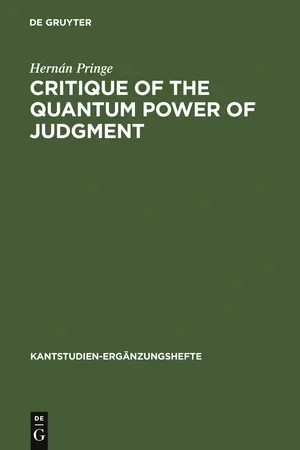
- 261 pages
- English
- PDF
- Available on iOS & Android
Critique of the Quantum Power of Judgment
About This Book
The Critique of the Quantum Power of Judgement analyzes the a priori principles which underlie the empirical knowledge provided by quantum theory. In contrast to other transcendental approaches to quantum physics, none of the transcendental principles established by Kant is modified in order to cope with the new epistemological situation that arises with the asumption of the quantum postulate. Rather, by considering Bohr's views, it is argued that classical concepts provide the mathematical formalism of quantum theory with physical reference through symbolic analogies in the strict Kantian sense.
The main result of the investigation is the determination of the highest principle under which quantum objects are subsumed. This principle states that the conditions of the possibility of the systematic unity of contextual experience are at the same time the conditions of the possibility of quantum objects. Upon this principle rests the possibility of any a priori synthetic knowledge of quantum objects. Therefore, the Critique of the Quantum Power of Judgement yields the prolegomena to any future quantum metaphysics.
Frequently asked questions
Information
Table of contents
- Introduction
- Part I Kantian Preliminaries
- 1 Kant on the Concepts of Analogy and Symbol
- 1.1 Analogies of Experience
- 1.2 Symbolic Analogies
- 1.3 Conclusions
- Part II The Conceptual Development of Bohr’s Thought
- 2 Correspondence
- 2.1 The Germ of Correspondence: The Hydrogen Atom
- 2.2 The Development of Correspondence: Multiperiodic Systems
- 2.3 The Crisis of Correspondence: The Bohr-Kramers-Slater Theory
- 2.4 Conclusions
- 3 Complementarity
- 3.1 Quantum Objects Are Not Directly Presentable in Intuition
- 3.2 Quantum Objects Are Indirectly Presentable in Intuition
- 3.3 Uncertainty Relations, Complementarity and Symbolism
- 3.4 Measurement and Definition
- 3.5 Matrix and Wave Mechanics
- 3.6 Conclusions
- 4 The Symbolic Character of Quantum Theory and the EPR Paper
- 4.1 The EPR Argument
- 4.2 The Insufficiency of Operationalism
- 4.3 An Example: A Position Measurement
- 4.4 The Ambiguity of EPR’s Realism
- 4.5 Bohr’s Criterion of Reality
- 4.6 Objective Validity and Objective Reality of the Concept of a Quantum Object
- 4.7 The Completeness of Quantum Theory
- 4.8 Conclusions
- 5. Between Kant and Bohr: Harald Høffding
- 5.1 Bohr on Symbolic Knowledge
- 5.2 Symbol in the Broad Sense
- 5.3 Symbol in the Strict Sense
- 5.4 Conclusions
- Part III A Transcendental Foundation of Quantum Objectivity
- 6 Critique of the Quantum Power of Judgment
- 6.1 Analytic of the Quantum Power of Judgment
- 6.2 Dialectic of the Quantum Power of Judgment
- 6.3 Methodology of the Quantum Power of Judgment
- 6.4 Appendix: Bohr on Purposiveness and Complementarity
- 6.5 Conclusions
- 7 On Other Transcendental Approaches to Quantum Mechanics
- 7.1 Cassirer’s Concept of Symbol and Quantum Theory
- 7.2 Hermanns Fragmentation of Truth
- 7.3 Mittelstaedt’s Non-Objectively Real Objects
- 7.4 Bitbol’s Pragmatic-Transcendental Approach
- 7.5 Petitot’s Transcendental Aesthetic of Hilbert Space
- 7.6 Strohmeyer, Infinite Judgments and the Principle of Complete Determination
- 7.7 Von Weizsäcker’s Transcendental Foundation of Quantum Theory
- 7.8 Conclusions
- Epilogue
- Bibliography
- Author index